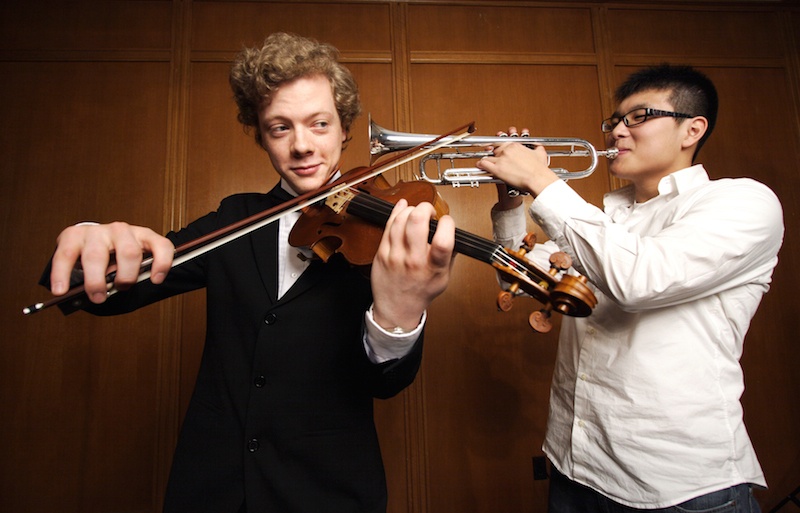That said, there’s got to be benefits to being a “night owl” as well, right? Indeed, there are. What was perhaps most surprising to me is that there are quite a lot of benefits. So, what do night owls gain by staying up until one in the morning every night?
1. They might be smarter.
While night owls won’t have too much of an intellectual advantage over their early bird counterparts, studies have shown that those who stay up late and sleep in on a regular basis are slightly smarter than those who are consistently up at the crack of dawn. The reasons for this are based on a few avant garde scientific theories related to evolution — particularly that “evolutionarily novel” tendencies such as disregarding traditional sleep cycles demonstrate advanced adaptive ability. Of course, that’s not to say that night owls get all of the perks. While their behavior might be connected to higher intelligence, other studies demonstrate that being an early bird gives one a higher chance to succeed in life. So perhaps it’s best to be a hybrid of both birds. Maybe we can call it an “early owl”?
2. They are more creative.
Staying up late on a consistent basis is apparently such an offbeat thing to do, that it literally changes the way your brain works. Indeed, being a night owl encourages your mind to think of solutions and ideas that are beyond the scope of traditional thinking. According to sleep expert Jim Horne, this means that night owls are more likely to become successful “poets, artists, and inventors,” all of which are jobs that require a lot of out-of-the-box thinking. As a night owl myself, I do have a bit of anecdotal evidence that backs this up. While I do try to get work done in the mornings, I often have my best ideas at night. It’s almost like staying up those extra hours unlocks a portion of my mind that I didn’t have access to earlier in the day.
3. They become physically stronger later in the day.
While an early bird’s strength tends to remain consistent throughout the day, a night owl’s physical ability rises as the hours go by, usually allowing them to surpass their early rising counterparts by nighttime. And don’t worry, the increase isn’t that drastic. It’s not like night owls are able to morph into the Hulk at night, or anything like that. It just means that their endurance and strength has more peaks and valleys than an early bird’s, which comes with both advantages and disadvantages. For one, it makes it harder for us to exercise in the mornings. I know that from experience. But on the flip side, I feel like I can run forever if I start my workout any time past 3 p.m. So if you like working out later in the day, being a night owl is pretty great. Just know that it will be relatively tough to do anything physically demanding right after waking up, which can make it hard to get your exercise in during the hot summer months.
4. They are part of a renowned group.
There are many famous people who are night owls, the most well-known today probably being President Barack Obama, who chooses to stay up reading past midnight despite working incredibly long days. And how about the man who kept Germany from taking England during World War II? That’s right, Winston Churchill was a night owl too. But if Presidents and Prime Ministers aren’t your thing, you can sleep easy knowing that Emperor Napoleon Bonaparte took cat naps during the day so that he could skip sleep entirely on some days. And in a recent interview, famed chef Gordon Ramsay revealed that he only sleeps for four hours a day during the week, staying up late into the night to get all of his work done (perhaps that explains his crankiness!). I could go on forever, as the list of renowned folks with abnormal sleep patterns is pretty enormous. I’ll end by revealing two more night owls you might be familiar with: famous (and perhaps infamous depending on your point of view) inventors Thomas Edison and Leonardo da Vinci. There is no doubt: if you consider yourself to be a night owl, then you are in some very good company.
5. They don’t need as much sleep.
If you read some of the links above discussing the sleeping habits of famous folks like Churchill and Napoleon, you’ll notice a common trend: they often skipped sleep, or replaced it entirely with naps so that they could stay up late into the night and get their work done. Luckily for us, there is some scientific research that might explain why that is. Apparently, early birds require more sleep than night owls, as revealed by one study where both early birds and night owls were asked to sleep seven hours a day for two days, during which their abilities would be tested. The results were intriguing: while the early birds were able to keep up with the night owls for the first ten hours after waking, they showed signs of tiredness and sleep deprivation beyond that point. The night owls, on the other hand, continued to perform at a high level even after they had been up for ten hours. What this means is that, on average, early birds need more sleep — more than seven hours a day — while for night owls seven hours is often more than enough. While there are certainly many benefits to being an early bird, being a night owl has its own advantages as well. Though we usually wake up later in the day, or require naps to function properly, we also have the ability to work at a high level even when sleeping for well-below the recommended 8 hours a day. If you are a night owl who has always been jealous of those who can easily pull themselves out of bed at the crack of dawn, then hopefully this article provides you with some amount of solace. Feel free to tell me any of your night owl related stories in the comments below! Featured photo credit: Code & Martini/Ivana Vasilj via flic.kr




